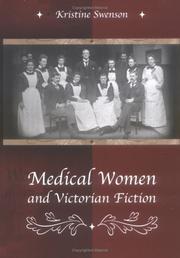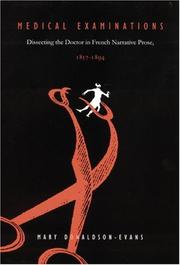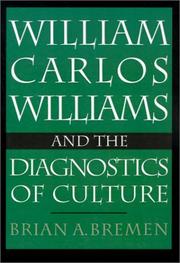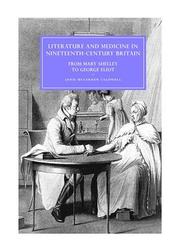| Listing 1 - 10 of 46 | << page >> |
Sort by
|
Book
ISBN: 9781789624724 9781789620610 1789629799 178962472X Year: 2020 Publisher: Liverpool : Liverpool University Press,
Abstract | Keywords | Export | Availability | Bookmark
 Loading...
Loading...Choose an application
- Reference Manager
- EndNote
- RefWorks (Direct export to RefWorks)
"John Keats was a trained surgeon who studied at Guy's Hospital, London while simultaneously making his way as a poet. This book focuses attention on an important but hitherto neglected Keats manuscript: the notebook he maintained during this period. Reconstructing the lively medical world that played a formative role in Keats' intellectual and imaginative development, it seeks to show the intriguing connections between Keats' medical knowledge and his greatest poetry. It offers new research on Keats' medical career -- including a new edition of his medical Notebook compiled from the manuscript -- and recovers the various ways in which Keats' creativity found expression in his two careers of medicine and poetry, enriching both. Topics explored include the 'hospital poems' Keats wrote at Guy's; the medical milieu of his daily life; his methods of working as revealed by his medical Notebook and other archival sources; and the medical contexts that informed his composition of Endymion and the collection Lamia, Isabella, The Eve of St Agnes, and Other Poems (1820). John Keats' Medical Notebook: Text, Context and Poems reveals how Keats' visceral knowledge of human life, gained during his medical training at Guy's, transformed him into 'a mighty poet of the human heart'."--
Medicine and literature. --- Physicians as authors --- Literature and medicine --- History --- Keats, John, --- Knowledge and learning. --- Notebooks, sketchbooks, etc. --- Criticism and interpretation. --- 1800-1899 --- England. --- John Keats --- Keats manuscript --- history of medicine --- Romantic poetry --- Guy's Hospital --- Literature and medicine.
Book
ISBN: 0821444069 9780821444061 9780821419908 0821419900 Year: 2012 Publisher: Athens Ohio University Press
Abstract | Keywords | Export | Availability | Bookmark
 Loading...
Loading...Choose an application
- Reference Manager
- EndNote
- RefWorks (Direct export to RefWorks)
If nineteenth-century Britain witnessed the rise of medical professionalism, it also witnessed rampant quackery. It is tempting to categorize historical practices as either orthodox or quack, but what did these terms really signify in medical and public circles at the time? How did they develop and evolve? What do they tell us about actual medical practices? Doctoring the Novel explores the ways in which language constructs and stabilizes these slippery terms by examining medical quackery and orthodoxy in works such as Mary Shelley's Frankenstein, Charles Dickens's Bleak House and Little Do
Physicians in literature. --- Quacks and quackery in literature. --- Literature and medicine --- English fiction --- History --- History and criticism.
Book
ISBN: 2913322433 284867685X 9782913322431 Year: 2000 Volume: 685 90 Publisher: Besançon: Presses universitaires franc-comtoises,
Abstract | Keywords | Export | Availability | Bookmark
 Loading...
Loading...Choose an application
- Reference Manager
- EndNote
- RefWorks (Direct export to RefWorks)
Le personnage du médecin, le rapport du patient avec un corps souffrant suscitent un intérêt privilégié dans le domaine littéraire. Certains auteurs étudiés dans le cadre d’un séminaire de DEA ont eux-mêmes pratiqué la médecine ou ont été témoins d’un père qui la pratiquait. D’autres ont observé sur eux les progrès d’une maladie. Le regard de l’écrivain a pu être marqué par la sympathie ou par une distance entraînant une peinture caricaturale. Des fictions romanesques ou dramatiques, des essais, des écrits autobiographiques gardent la trace d’un tel intérêt. Les études portent sur la littérature française, espagnole, anglaise, allemande. Les auteurs des communications sont en général spécialistes de littérature. Des médecins ont aussi apporté leur collaboration.
Literature and medicine --- Medicine in literature. --- History & Philosophy Of Science --- Literary Theory & Criticism --- médecine --- littérature --- séminaire --- médecin --- corps --- maladie --- caricature --- fiction

ISBN: 082626431X 9780826264312 0826215661 9780826215666 Year: 2005 Publisher: Columbia University of Missouri Press
Abstract | Keywords | Export | Availability | Bookmark
 Loading...
Loading...Choose an application
- Reference Manager
- EndNote
- RefWorks (Direct export to RefWorks)
English fiction --- Literature and medicine --- Medicine in literature. --- Physicians in literature. --- Women and literature --- Women physicians in literature. --- Medical care in literature --- History and criticism. --- History
Book
ISBN: 0585029873 9780585029870 0809310287 9780809310289 Year: 1981 Volume: #15 Publisher: Carbondale : Southern Illinois University Press,
Abstract | Keywords | Export | Availability | Bookmark
 Loading...
Loading...Choose an application
- Reference Manager
- EndNote
- RefWorks (Direct export to RefWorks)
Literature and medicine --- Medicine in Literature --- Literature --- Humanities --- Literature - General --- Languages & Literatures --- Literatures --- Literature, Medicine in --- in Literature, Medicine --- Medicine and literature --- Medicine --- Congresses --- Congresses.

ISBN: 0803202474 9780803202474 0803266286 9780803266285 Year: 2000 Publisher: Lincoln University of Nebraska Press
Abstract | Keywords | Export | Availability | Bookmark
 Loading...
Loading...Choose an application
- Reference Manager
- EndNote
- RefWorks (Direct export to RefWorks)
Medical fiction --- Literature and medicine --- Physicians in literature. --- French fiction --- Medicine and literature --- Medicine --- History and criticism. --- History --- History and criticism
Book
ISBN: 9783484351172 3484351179 3119166960 9786611999780 1281999784 3484970499 9783484970496 9781281999788 6611999787 Year: 2008 Volume: 117 Publisher: Tübingen: Niemeyer,
Abstract | Keywords | Export | Availability | Bookmark
 Loading...
Loading...Choose an application
- Reference Manager
- EndNote
- RefWorks (Direct export to RefWorks)
Im Rahmen der derzeit kurrenten Untersuchungen zu den Relationen zwischen Literatur- und Wissenschaftsgeschichte macht der Band den Vorschlag, Schnittmengen und Differenzen zwischen medizinischem Wissen und literarischen Texten über die auf beiden Feldern gleichermaßen zentrale Kategorie der Schreibweise zu untersuchen. Die verschiedenen Textsorten der Medizin - vom Traktat über die Dissertation bis zur Fallgeschichte - werden dabei ebenso auf ihre Darstellungsrhetorik und narrative Strukturen hin analysiert wie die auf ein medizinisches Menschenbild gestützten literarischen Genres zwischen Aufklärung und Naturalismus. Die dreizehn Beiträge des Bandes verfolgen die Geschichte dieser Wechselbeziehung von ihrer engen Interaktion in der Gelehrtenkultur der Frühen Neuzeit über den Prozess der funktionalen Ausdifferenzierung von Wissenschaft- und Kunstsystem im 18. Jahrhundert bis zur Wiederannäherung der ,zwei Kulturen' in der Moderne.
Krankheit (Motiv).
---
Krankheit

ISBN: 1280441275 1423734750 0195344944 1602566151 9781423734758 9781602566156 9780195072266 019507226X 019507226X 0197726852 Year: 1993 Publisher: New York Oxford University Press
Abstract | Keywords | Export | Availability | Bookmark
 Loading...
Loading...Choose an application
- Reference Manager
- EndNote
- RefWorks (Direct export to RefWorks)
Examines the development of Williams' poetics, focusing in particular on his continuing fascination with the effects of poetry and prose, and his lifelong friendship with the poet and critic Kenneth Burke.
Book
ISBN: 3110306115 9783110306118 3110305720 9783110305722 3110306123 9783110306125 9781306205436 1306205433 Year: 2014 Publisher: Berlin De Gruyter
Abstract | Keywords | Export | Availability | Bookmark
 Loading...
Loading...Choose an application
- Reference Manager
- EndNote
- RefWorks (Direct export to RefWorks)
The idea of contagious transmission, either by material particles or by infectious ideas, has played a powerful role in the development of the Western World since antiquity. Yet it acquired quite a precise signature during the process of scientific and cultural differentiation in the 19th and early 20th centuries. This volume explores the significance and cultural functions of contagionism in this period, from notions of infectious homosexuality and the concept of social contagion to the political implications of bacteriological fieldwork. The history of the concept 'microbe' in aesthetic modernism is adressed as well as bacteriological metaphors in American literary historiography. Within this broad framework, contagionism as a literary narrative is approached in more focussed contributions: from its emotional impact in literary modernism to the idea of physical or psychic contagion in authors such as H.G. Wells, Kurt Lasswitz, Gustav Meyrinck, Ernst Weiss, Thomas Mann and Max Frisch. This twofold approach of general topics and individual literary case studies produces a deeper understanding of the symbolic implications of contagionism marking the boundaries between sick and healthy, familiar and alien, morally pure and impure.
Communicable diseases in literature. --- Literature and medicine. --- Contagion (Social psychology) --- Social contagion --- Social psychology --- Memetics --- Medicine and literature --- Medicine --- Contagion (Social psychology). --- Contagionism. --- bacteriology. --- illness narratives. --- literary Modernism. --- medical metaphors.

ISSN: 17473136 ISBN: 9780511484742 9780521843348 9780521066679 9780511266171 0511266170 0511263929 9780511263927 051126545X 9780511265457 0511484747 1280750189 9781280750182 0521843340 0511264755 9780511264757 0521843340 0521066670 1107163609 9781107163607 0511331665 9780511331664 Year: 2004 Volume: 46 Publisher: Cambridge: Cambridge university press,
Abstract | Keywords | Export | Availability | Bookmark
 Loading...
Loading...Choose an application
- Reference Manager
- EndNote
- RefWorks (Direct export to RefWorks)
Outside back cover : "Although we have come to regard 'clinical' and 'romantic' as oppositional terms, romantic literature and clinical medicine were fed by the same cultural configurations. In the pre-Darwinian nineteenth century, writers and doctors developed an interpretive method that negotiated between literary and scientific knowledge of the natural world. Literary writers produced potent myths that juxtaposed the natural and the supernatural, often disturbing the conventional dualist hierarchy of spirit over flesh. Clinicians developed the two-part history and physical examination, weighing the patient's narrative against the evidence of the body. Examining fiction by Mary Shelley, Carlyle, the Brontës and George Eliot, alongside biomedical lectures, textbooks and articles, Janis McLarren Caldwell demonstrates the similar ways of reading employed by nineteenth-century doctors and imaginative writers and reveals the complexities and creative exchanges of the relationship between literature and medicine."
English literature --- Medicine in literature. --- Literature and medicine --- Women and literature --- English fiction --- Medical care in literature --- History and criticism. --- History --- Women authors --- Fiction --- Thematology --- anno 1800-1899 --- Arts and Humanities --- Literature
| Listing 1 - 10 of 46 | << page >> |
Sort by
|

 Search
Search Feedback
Feedback About UniCat
About UniCat  Help
Help News
News